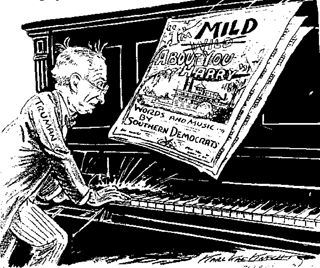
|
As Part of the Conservative
Coalition, Southern Democrats Opposed President Truman Time and
Again
Truman Library |
 Truman,
like most presidents who have stepped into the office upon the death
of their predecessor, indeed like any vice-president in American history
in that position, felt it his responsibility to continue the policies
and the politics of his predecessor, Franklin Roosevelt. And so the
early years that Truman is in office between 1945 and 1948 were designed
particularly by Harry Truman to be an extension of Franklin Delano Roosevelt's
New Deal policies. Truman turned his full attention to domestic affairs
after the surrender of the Japanese. He immediately began sending to
Congress a whole series of New Deal-like kinds of bills that he wanted
Congress to enact. Among these New Deal kinds of measures were the following: Truman,
like most presidents who have stepped into the office upon the death
of their predecessor, indeed like any vice-president in American history
in that position, felt it his responsibility to continue the policies
and the politics of his predecessor, Franklin Roosevelt. And so the
early years that Truman is in office between 1945 and 1948 were designed
particularly by Harry Truman to be an extension of Franklin Delano Roosevelt's
New Deal policies. Truman turned his full attention to domestic affairs
after the surrender of the Japanese. He immediately began sending to
Congress a whole series of New Deal-like kinds of bills that he wanted
Congress to enact. Among these New Deal kinds of measures were the following:
- a
bill to raise the minimum wage from 40 to 65 cents per hour
- a
bill to extend and expand social security coverage
- an
extensive slum clearance and national housing plan
- a
national health insurance plan
A New Conservative
Coalition
Truman had almost no success between 1945 and 1948 in getting any
of these New Deal-type bills, any of these New Deal-type reforms through
Congress. Why not? Unlike Franklin Roosevelt, Truman faced a new opposition
in Congress, an opposition that FDR himself might have had to face had
he lived to fill out his fourth term in office. A new conservative
coalition came primarily from a loose kind of cooperation between
Southern Democrats and Northern and Midwestern Republicans. Southern
Democrats were far more conservative fiscally, economically, politically,
than were their counterparts in the Northeast or the Midwest. Those
Southern Democrats eventually would oppose Truman not only out of their
fiscal and economic conservatism, not only out of their suspicion of
too much government, but also because of Truman's growing stance on
civil rights for black Americans. Northern Republicans, whether in the
Northeast, Midwest, or Far West, generally opposed all New Deal programs,
all government involvement in the economy, and most definitely a New
Deal liberal such as Harry Truman
  |
Anti-Truman
Campaign Buttons Worn by Republicans and Some Democrats
see: http://ronwade.freeservers.com/ |
And so, here was this new
coalition, a coalition that would essentially dominate Congress and
national affairs for the next quarter of a century. This coalition represented
a new political conservatism, borne largely out of opposition to New
Deal liberalism, borne in part out of opposition to FDR's internationalist
stance during World War II. Members of this new coalition argued that
while big government may have been necessary during the war, Truman's
plans for continued large-scale involvement in the economy and in social
welfare reforms had no place in peacetime America. The public attitudes
of frustration, of desperation, that had sparked New Deal liberalism
were no longer dominant in America in the postwar decade. The new coalition
also had ample grounds to oppose Truman because of a series of political
mistakes he made between 1945-1947.
As the midterm
congressional elections of 1946 loomed nearer, Truman and his supporters
were in sad shape. Liberals still pined for Franklin Roosevelt. Truman
acted in a very heavy-handed way with American labor unions. When labor
unions went on strike during the late months of 1945, and throughout
the year 1946, Truman initially responded by harshly denouncing unions
and their leaders, even calling at one point for the need to "hang
a few traitors and make our own country safe for democracy." His
haphazard inflation policies were hurting consumers. A variety of groups
in American society were discouraged about the leadership, or lack of
leadership, of this new administration. Truman often seemed to many
critics to be a man who could not do anything right, a man who became
the butt of countless political jokes such as "you just sort of
forget about Harry until he makes another mistake." Truman's level
of support dropped consistently. When he had assumed the Presidency,
national polls demonstrated that 87 percent of the public supported
him. By the midterm elections in November, support had dropped to 32
percent. Gleeful Republicans were going around the country asking "Had
enough? Had enough?" Soon the phrase would be "To err is
Truman."
|
William
J. Fulbright, U.S. Senate 1945-1974
U.S. Senate Archives |
The voters showed
that they had "had enough." Republicans picked up eleven seats
in the United States Senate, 56 new seats in the House of Representatives.
One Southern Democrat, Senator William Fulbright of the state of Arkansas,
even suggested that Truman ought to provide the public with a Republican
administration that it clearly wanted by appointing a leading Republican
as Secretary of State (at that point the Secretary of State was next
in line for the presidency). Having done so, said Fulbright, Truman
should then resign and let that Republican take over the White House.
The midterm elections of 1946 gave Republicans, for the first time
since 1928, control of Congress. And so it was this kind of conservative
coalition, this kind of new Republican-dominated Congress that Harry
Truman faced, in which he hoped to build or rebuild the old political
constituency and once again push Franklin Roosevelt's New Deal policies. |